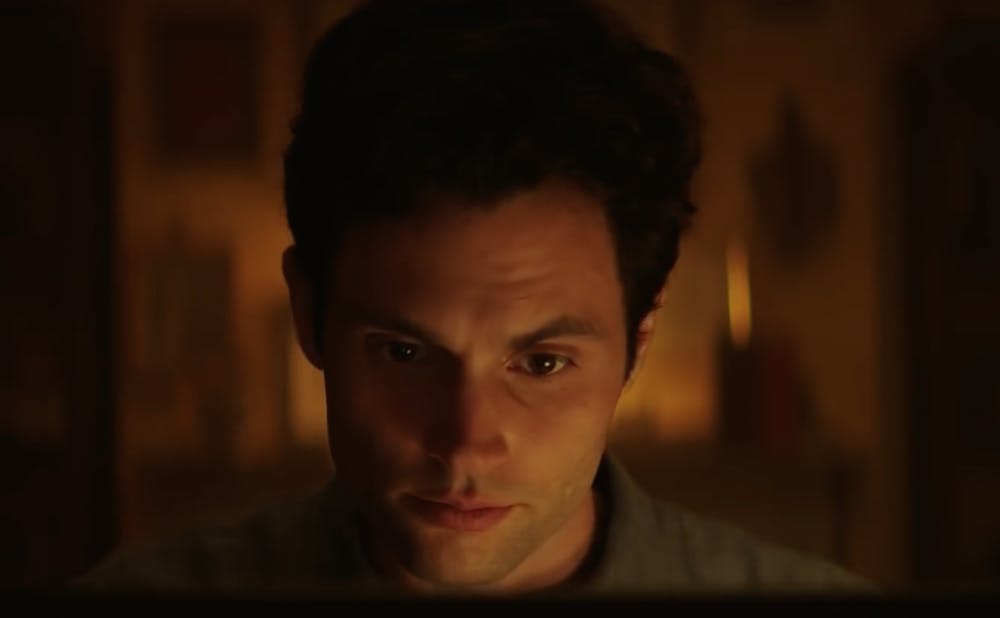If you’ve seen one romantic comedy, you’ve seen them all. The genre’s tropes are well-known: There’s the misunderstood brooding male love interest, the quirky yet loveable female heroine we can’t help but root for, the dowdy best friend whose main plot point is to encourage the heroine until she gives in to the hero’s strange quirks and learns to love him anyway. We get so wrapped up in the romance of the plot — usually the classic “will they/won’t they” — that we don’t stop to question whether these tropes are good or healthy.
That’s where Lifetime’s hit TV show “You” — which was recently acquired by Netflix — comes in: The not-so-romantic thriller forces us to not just question but actively challenge these tropes by turning each of them on their heads. The affable heroine is quirky but selfish; her best friend is supportive on the outside but harbors a secret vendetta and an obsessive desire to control people; and, oh yeah, her perfect knight in shining armor is a murderous, abusive stalker.
“You” opens with a classic boy-meets-girl scenario. Beck (played by Elizabeth Lail), a young writer, wanders into an eclectic old bookstore to purchase a copy of the novel “Dangerous Characters.” Joe (Penn Badgley), the brilliant, lovelorn bookstore manager with a face straight out of a fairytale, finds her perusing the aisle. Together they strike up a witty conversation about literary greats and critique the choices of the store’s patrons before they exchange names at the register. In this charming introduction, Joe and Beck are at their most clichéd: two beautiful, pretentious, cookie-cutter characters straight out of any typical romance novel. What this classic setup fails to include in its model of modern romance is that Joe is a psychopath, and, with one simple book transaction, Beck has also purchased herself a stalker.
Subverting every romance trope while still clinging to others, the TV adaptation of Caroline Kepnes’ debut novel “You” walks us through Joe and Beck’s tumultuous relationship through Joe’s eyes as he carefully constructs the perfect narrative to entrap her. We see how he selects her, inserts himself in her life and then grooms her to fall in love with him — all the while narrating in his head to us about why his invisible abuse really is the highest form of love. The audience is supposed to be shocked and enthralled by Joe’s increasingly lethal conspiracies as well as his complicated and somewhat sympathetic backstory.
By all measures, the show should be too horrific to watch, or at the very least too problematic. In the era of #MeToo, what should we make of a show designed to put the audience in the shoes of a stalker and murderer? Should we be disgusted with the premise as normalizing gender violence, or should we let the show’s obvious criticism of Joe and the greater romance tropes that enable him assure us that “You” really is just harmlessly riveting television?
“You” has some problematic elements, like forcing us to sympathize with a stalker, but dismissing it outright would mean sacrificing its larger nuance. The show does make some pretty feminist-savvy criticisms that makes it worth watching, ranging from Joe’s friend group that normalizes abusive behavior by verbally encouraging him to stalk and pursue Beck to its much more ambitious criticism of social media culture, which encourages young people, especially vulnerable women, to present themselves as perfect, consumable objects lonely men can project their longing and desires onto. Joe’s comment alone that he’s “seen enough romantic comedies to know good guys like me often get into these situations” while hiding in Beck’s shower inches away from her face as she brushes her teeth warrants serious consideration as provocative social analysis. But for all the rom-com tropes “You” does subvert, its deeper criticism lies below the surface.
Joe’s internal monologue is heard by the audience but dedicated to Beck, to the “you” the show takes its name from. But the “you” he objectifies — the “you” that the audience struggles to get to know through Joe’s delusional eyes — is the “you” that Beck has invented in a society that encourages us to self-brand and market ourselves to each other. On her Instagram, Facebook and Snapchat pages, Beck struggles to convince herself that she’s like the rich girls she surrounds herself with, cultivating a falsified and carefree exterior on social media that both she and Joe are obsessed with checking, even while they claim to resent it. Her deep desire to fit in with her friends even infects Beck’s poetry, leading her to refer to herself only in the second person.
Even while Beck’s selfishness torpedoes the relationships of the people around her, Beck never refers to herself in the first person, even in her most personal narratives, imagining herself as an other even to herself, long before she realizes Joe is doing the same to her. Therein lies “You”’s most haunting irony and its most enduring criticism, which makes Beck’s haunting final question when she discovers who Joe really is — “Didn’t you ask for it?” — so deeply disturbing. “You” exposes the paradox of wanting to be ourselves while curating social media profiles that barely reflect it, making us wonder: are we to blame for our own unhappiness?
Get The Chronicle straight to your inbox
Signup for our weekly newsletter. Cancel at any time.

